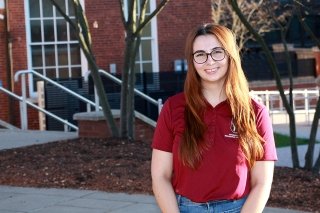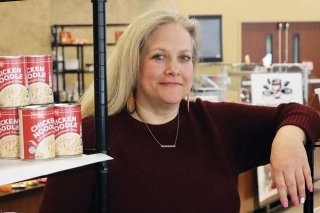Senior has desire to help those in developing countries
Bloomsburg
Posted

Ashley Moreno is a senior at Bloomsburg University, majoring in nursing, applied and research anthropology. As a triple major, it has been challenging for Moreno to balance her time, however Moreno comes from a family of overachievers.
Moreno always knew she wanted to be a nurse. “In high school, I realized I wanted to go into maternity and infant nursing because I love babies,” said Moreno. She added the applied and research anthropology majors after her freshmen year. “I fell in love with anthropology. I learned how culture is so different around the world.“
With a triple major, Moreno has had to carry a full load of classes every semester and on breaks. “I know exactly what I want to do with my life, so I push myself through school knowing that I am getting closer to my dream career one step at a time,” Moreno said.
“I need to know how they [people in other countries] interact with their environment, with society and with different cultural practices that directly relate to how they experience healthcare,” she says. After Bloomsburg, Moreno will be applying for labor and delivery positions in the U.S. to obtain a years’ experience in the nursing field, so that she can work internationally in the future.
“I want to help lower infant mortality rates in developing countries,” she states. Moreno knew she wanted to travel after visiting Rwanda with a Study Abroad Global Health Program. The group included students from Brigham Young University (BYU) in Utah. Moreno had the chance to really broaden her perspectives on culture because many of these students are Morman. “While I was learning about Rwandan culture, I also learned a lot about Morman religion,” she said.
Moreno is eager to learn as much as she can about the nursing field outside of her classes at BU.
The study abroad group visited a health center to observe what Rwandan healthcare was like. “I learned how different people are, whether it being a patient you run into or co-workers on the floor, someone might have completely different ideas and beliefs from you. [But] that’s no reason why they shouldn’t have access to healthcare, like anyone else,” she points out.
“After my first week there, I realized everyone’s going to think and view healthcare differently and you have to adapt to those ideas and beliefs in order to provide the best health care,” she commented.
While abroad, Moreno and her new friends sat in class with students from the University of Rwanda. "They always made us feel welcomed,” she says.
When the students had free time, they would all get together. “We would catch a bus and go hiking.” The Rwandan students “showed us how they get around,” Moreno adds.
In Rwanda, it is more common to take motorcycle taxis rather than cars to travel. Moreno said everyone was friendly. “We never went alone; we always had a group of us going together and our Rwandan friends always checked in on us.”
The special bonds made between Moreno and her new friends are secured through social media. “It’s a little more difficult to keep in touch with the Rwandan students because they do not use social media as much as we do here. But occasionally, I see updates on Instagram, and we interact with each other’s photos.”
For one day, the students in the program were able to experience a day in the lives of a true Rwandan. Moreno worked in fields, walked up and down hills for water, and fed grass to cows. “This experience gave me a different perspective on things you have that you don’t realize you were taking advantage of and that is what I came here for.”
Those three weeks in Rwanda served Moreno well as she continues her journey to become a traveling nurse to help those in need.



